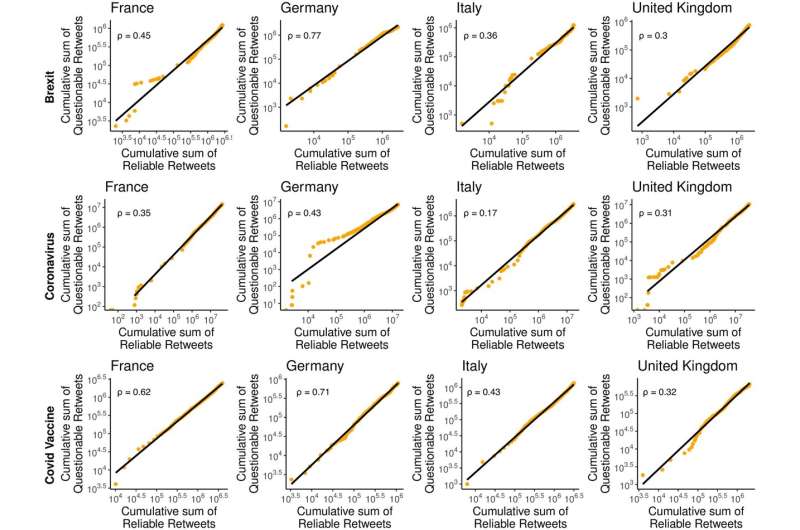ramonmercado
CyberPunk
- Joined
- Aug 19, 2003
- Messages
- 58,830
- Location
- Eblana
Cultural and National differences affect (mis) beliefs.
MAY 8, 2024
Editors' notes

Cumulative number of the total retweets received by questionable sources vs. the cumulative number of retweets for reliable sources across different countries and topics. Credit: Baqir et al., 2024, PLOS ONE, CC-BY 4.0 (https://creativecommons.org/licenses/by/4.0/)
The eventual prevalence of a piece of misinformation may depend on its topic and the country in which it spreads, with notable differences between the UK, Germany, France and Italy, according to a study published May 8 in the open-access journal PLOS ONE by Fabiana Zollo from the Ca' Foscari University of Venice, Italy, and colleagues. This finding suggests that policies to combat misinformation and polarization may need to be context-specific in order to be effective, the authors say.
Researchers analyzed news activity on Twitter (now X) in France, Germany, Italy and the UK from 2019 to 2021, including a focus on news about Brexit, the coronavirus, and the COVID vaccines. Each news source they analyzed was rated as either "reliable" or "questionable" based upon their NewsGuard (a tool that evaluates the reliability of news outlets based on nine journalistic criteria) score.
Across all four countries, the vast majority of users only ever consumed reliable news sources on each of the three topics. But in every country and in each topic, there was always a small percentage of users who only ever consumed questionable news sources—with very few people consuming a mix of both reliable and questionable sources. ...
https://phys.org/news/2024-05-misinformation-varies-topic-country-europe.html
MAY 8, 2024
Editors' notes
The spread of misinformation varies by topic and by country in Europe, study finds
by Public Library of Science
Cumulative number of the total retweets received by questionable sources vs. the cumulative number of retweets for reliable sources across different countries and topics. Credit: Baqir et al., 2024, PLOS ONE, CC-BY 4.0 (https://creativecommons.org/licenses/by/4.0/)
The eventual prevalence of a piece of misinformation may depend on its topic and the country in which it spreads, with notable differences between the UK, Germany, France and Italy, according to a study published May 8 in the open-access journal PLOS ONE by Fabiana Zollo from the Ca' Foscari University of Venice, Italy, and colleagues. This finding suggests that policies to combat misinformation and polarization may need to be context-specific in order to be effective, the authors say.
Researchers analyzed news activity on Twitter (now X) in France, Germany, Italy and the UK from 2019 to 2021, including a focus on news about Brexit, the coronavirus, and the COVID vaccines. Each news source they analyzed was rated as either "reliable" or "questionable" based upon their NewsGuard (a tool that evaluates the reliability of news outlets based on nine journalistic criteria) score.
Across all four countries, the vast majority of users only ever consumed reliable news sources on each of the three topics. But in every country and in each topic, there was always a small percentage of users who only ever consumed questionable news sources—with very few people consuming a mix of both reliable and questionable sources. ...
https://phys.org/news/2024-05-misinformation-varies-topic-country-europe.html


 As he is rubbing his hands in glee for all of the money he's getting. Because we all know that it is a book which is bringing TikTok its woes.
As he is rubbing his hands in glee for all of the money he's getting. Because we all know that it is a book which is bringing TikTok its woes.